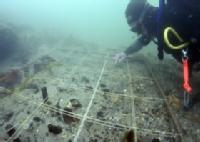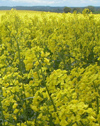News
See below for the latest news from the Warwick Crop Centre.
For our latest publications see Crop Centre in Print
Sedimentary DNA from a submerged site reveals wheat in the British Isles 8000 years ago
 A research team led by Dr Robin Allaby of the School of Life Sciences has found evidence of wheat reaching Britain 2000 years before the arrival of farming in the UK.
A research team led by Dr Robin Allaby of the School of Life Sciences has found evidence of wheat reaching Britain 2000 years before the arrival of farming in the UK.
This has a significant impact on our understanding of Britain in pre-Neolithic times, indicating that the ancient British were not cut off from mainland Europeans on an isolated island 8,000 years ago as previously thought with the most plausible explanation for the wheat reaching the site being the existence of social and trade networks. It is thought that these networks might have been assisted by land bridges that connected the south east coast of Britain to the European mainland, facilitating exchanges between hunters in Britain and farmers in southern Europe.
Evidence for a variety of wheat known as Einkorn was found from sedimentary DNA at a submerged archaeological site off the south coast of England (picture above by Roland Brookes, The Maritime Archaeology Trust).
The research work was completed in collaboration with co-leads Professor Vincent Gaffney of the University of Bradford and Professor Mark Pallen of Warwick Medical School, the Maritime Archaeology Trust, the University of Birmingham and the University of St. Andrews.
This research has been published in the academic journal Science, February 2015
More Information
Discovery of 100 million-year-old regions of DNA shows short cut to crop science advances
Scientists have discovered 100 million-year-old regions in the DNA of several plant species which could hold secrets about how specific genes are turned ‘on’ or ‘off’.
The findings, which are hoped will accelerate the pace of research into crop science and food security, are detailed by University of Warwick researchers in the journal The Plant Cell.
Life Sciences researchers involved in the research are Jim Beynon, Katherine Denby and Vicky Buchanan-Wollaston.
Research helps breeders really know their onions to enhance global food security
 Research led by the Warwick Crop Centre has developed a unique collection of information about the disease resistance of 96 of the world’s onion varieties. It will be a crucial resource for commercial growers and seed producers trying to combat one of the most difficult diseases affecting onion crops. This work may also have benefits in terms of and reduced fertiliser consumption and enhanced drought tolerance.
Research led by the Warwick Crop Centre has developed a unique collection of information about the disease resistance of 96 of the world’s onion varieties. It will be a crucial resource for commercial growers and seed producers trying to combat one of the most difficult diseases affecting onion crops. This work may also have benefits in terms of and reduced fertiliser consumption and enhanced drought tolerance.
The work on onions in this research funded by Defra (The Department for Environment, Food and Rural Affairs) is being carried out by Dr Andrew Taylor.
Life Sciences research aims to deliver oilseed rape with natural resistance to a serious virus disease
 The Biotechnology and Biological Sciences Research Council (BBSRC) has recently announced the first tranche of its £7 million Crop Improvement Research Club (CIRC) grants. The projects funded by BBSRC, the Scottish Government and 14 companies representing plant breeders, farmers and food processors, will carry out research to improve the quality and yield of oilseed rape, barley and wheat.
The Biotechnology and Biological Sciences Research Council (BBSRC) has recently announced the first tranche of its £7 million Crop Improvement Research Club (CIRC) grants. The projects funded by BBSRC, the Scottish Government and 14 companies representing plant breeders, farmers and food processors, will carry out research to improve the quality and yield of oilseed rape, barley and wheat.
One of the awards goes to Dr John Walsh (a research leader of Plant-Virus Interactions), Dr Graham Teakle (a brassica geneticist) and Dr Guy Barker (a researcher in brassica genomics) for a project entitled ‘Exploiting sources of resistance to Turnip yellows virus for deployment in oilseed rape’. Turnip yellows virus can reduce the seed yield of oilseed rape crops in the UK by up to 30%. Infected plants are largely symptomless and hence most farmers are unaware of the presence of the virus. This project looks to oilseed rape plants and wild relatives that have natural resistance to this virus with a view to identifying genetic markers that can be used for introducing these resistances into commercial varieties via modern breeding techniques.
